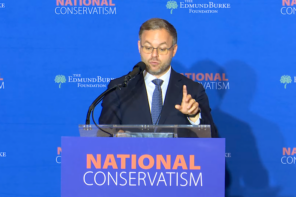The Handmaid’s Tale, Margaret Atwood’s 1985 novel about a future America ruled by Christian fundamentalists, is currently streaming on Hulu. But in 1990 it was made into a Hollywood movie, and one of its central characters, played by Robert Duvall, always stuck with me.

Robert Duvall as the Commander, in the 1990 movie adaptation of “The Handmaid’s Tale.”
Duvall’s “Commander” is a calm, square-jawed man with an air of quiet authority. He doesn’t seem like a despot, but he is an architect of a puritanical society that shutters schools, restricts women, executes “non-conformists,” and mandates 24/7 surveillance of citizens.
Ever since Mike Pence joined the Trump ticket, I’ve been haunted by Duvall’s character. What would that quiet, white, Christian male authority look like in today’s world, and what kind of society would Commander, oops, President Pence seek to build? As Trump’s troubles grow by the hour so does the urgency of these questions.
Online and off, the term Christofascism is creeping into conversations. Christofascism, a word coined by theologian Dorothee Sölle, refers to Christian authoritarianism, an outcome sought by some in the Religious Right. Theocracy is a terrifying vision for many Americans, but for those born between 1946 and 1964 Pence’s ideas are especially repugnant. That’s because for America’s 75 million baby boomers, Pence is one of their own. And if you’re a boomer opposed to the current administration, you’re likely wondering how things went so very wrong.
Growing up in an Irish Catholic family, Mike Pence was proudly Democratic. With John F. Kennedy as a patron saint, Pence became a high school Democratic coordinator. His first ever presidential vote was cast for Jimmy Carter.
But Pence belonged to a generation that wanted something more, and his current faith commitments are inseparable from his experience as a baby boomer. In the ‘60s and early ‘70s, the media depicted boomers as free-love hippies and anti-establishment rebels, but those eye-catching stereotypes failed to capture the generation’s true ambition. Many yearned for authenticity. They craved experience. They longed to know God and, just as important, for God to know them.
Some boomers joined cults. Others went to communes. Still others tuned in, turned on and dropped out. But many stayed where they were with a few tweaks.
Pence fell into the last group. He wasn’t about to drop acid or storm the Pentagon, but he did want to feel deeply connected to a truth beyond daily life. At college, he admired a group of evangelical students, and went with them to a Christian music festival.
In the 1970s, Christian youth leaders pioneered music festivals to keep their young in the fold. Camp meetings in the guise of Woodstock, the gatherings feature rock music, cool preachers and old-fashioned altar calls.
Finding God at the Ichthus Music Festival changed Mike Pence’s life. Before this born-again experience, his spiritual life felt empty, and he subsequently said that he’d been seeking a personal relationship with Jesus.
In the early 1980s, just when Pence was discovering his new “evangelical Catholic identity,”his co-religionists were becoming politicized. Running for president in 1980, Ronald Reagan targeted this group and his election gave many an unprecedented sense of power and possibility. The Rev. Jerry Falwell had access to the White House but a whole other game was being played at the grass roots. Local evangelical churches were writing voters guides, protesting at “abortion” clinics, and running candidates for local office.
Many of those leading the charge were baby boomers, now parents and professionals. They felt deeply about the pro-life movement and, just as others in their generation had embraced the anti-war cause, threw themselves into their own struggle to protect life.
By the mid-1980s, Reagan replaced JFK as Pence’s patron saint. Even if Reagan had not fulfilled his campaign promises to the evangelicals, he put their concerns on the national agenda. In 1988, when be was running for Congress, Pence stopped by the White House to pay his respects. “Mr. President,” he said. “I just want to thank you for everything you’ve done to inspire my generation to believe in this country again”
For Mike Pence, like many conservative evangelicals who came of age in the 1970s and 1980s, believing in this country is one and the same as believing in God’s plan for the country. Like their contemporaries, they, too, sought a better world but theirs—infused with rightwing religion—looked very different from the romantic utopianism of the pot smokers, the Marxist visions of the Weathermen or even the moderate Clintonism of those who worked within the system.
Militant conservative evangelicals (or Christofascists) have been organizing below outsiders’ radar for more than four decades. Their efforts have taken many forms: the pro-life, homeschooling, and defense of marriage movements; capturing school boards, gerrymandering of state districts and building organizations ranging from Focus on the Family to the Quiverfull movement and Generation Joshua.
Those who fear Christofascism are troubled by Mike Pence’s current position. That’s because Pence, who defines himself as “a Christian, a conservative, and a Republican in that order,” is true believer. A deeply conservative evangelical—he began attending evangelical church in the mid-1990s—he’s used elective office to advance a rightwing religious agenda. Throughout his political career, Pence has ardently opposed abortion, gay rights, trade unions, and environmental legislation. He has championed deregulation as well as for tax cuts for the wealthy, and a free market that neither bails out failing companies nor assists unemployed workers.
Is Pence the last gasp of the baby boom hegemony—a misguided generation’s yearning for spiritual connection and a better world? Or is he the start of something akin to what Margaret Atwood imagined 30 years ago when The Handmaid’s Tale seemed nothing more than speculative fiction?





